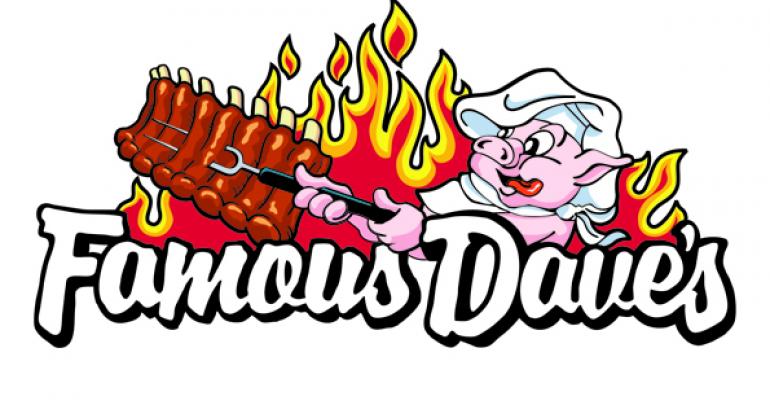Famous Dave’s of America Inc. plans to more actively sell company restaurants to franchisees, CEO Ed Rensi said Wednesday, a move expected almost from the day he took the job five months ago.
The casual-dining operator is “evaluating refranchising certain company-owned restaurants” and a “more active refranchising strategy,” Rensi said during the company’s third-quarter conference call.
Refranchising is part of a number of changes that Rensi is making in an attempt to turn around the Minneapolis-based barbecue chain, along with reduced discounting.
Same-store sales during the third quarter ended Sept. 28 fell 5.7 percent at company-owned units and 2.3 percent at franchised locations, Famous Dave’s said Wednesday. The company blamed the decline on its decision to end strategic discounting.
“We’ve had a lot of firewood to chop,” Rensi said. “We made strategic decisions that are important for the long-term success of the brand. And we felt it was important to stop relying on heavy discounting for sales.”
The decline in same-store sales took a toll on the company during the third quarter. Revenue fell 4.7 percent, to $37.7 million, from $39.5 million the previous year.
While net income more than doubled, to $2 million, from $737,000 during the third quarter of 2013, the result was nearly all due to the chain lapping some one-time charges that were not on the books this year.
Restaurant-level cash flow margins decreased by 20 basis points, to 12 percent, from 12.2 percent. Executives suggested that was low, given the sales decrease, and reflected the chain’s reduced discounts. The company aims to lift those margins to 15 percent, Rensi said.
Refranchising has long been considered a possibility for Famous Dave’s. Several franchisors have been selling restaurants to operators over the years, including Wendy’s, Arby’s, Yum! Brands, Applebee’s, Burger King and others. TGI Fridays has also recently said it will start selling units.
Rensi did not provide many details of how many units Dave’s could sell to franchisees, but he said the company would look to sell restaurants to existing operators, as well as new franchisees. The company owns 53 of the chain’s 191 locations.
One of Famous Dave’s challenges involves 12 of its units, which together accounted for half of the company’s same-store sales decline for the quarter and the year so far, executives said. They blamed a range of reasons for the struggles of those units.
“It’s a combination of all the things you see in restaurants,” Rensi said. “A couple are just bad real estate. Some are poor operations.”
While some of those problems can be fixed, Rensi left open the possibility of closing some units with poor real estate.
As for sales, Rensi warned that it would take some time for the chain to recover from the heavy discounting.
“We’re going to see this discounting headwind through the end of (the first quarter 2015),” Rensi said.
But the company says there are indications that it is adding more non-discount customers. Richard Pawlowski, Famous Dave’s chief financial officer, said that, minus discounting traffic, same-store sales would have been higher during the third quarter. Those sales would have been negative in the second quarter.
“In my 47 years in the restaurant business, relying on a strategic discounting program has not proven to be a long-term, winnable strategy,” Rensi said. “Our results are beginning to validate our strategy.”
Rensi, a former McDonald’s executive, took the helm at Famous Dave’s in February on an interim basis and was given the permanent job in May. His arrival came not long after a pair of activists, Patrick Walsh and later Adam Wright, took seats on the chain’s board of directors.
A number of executives left the company or were fired, including longtime CFO Diana Purcel, who left in May, and Christopher O’Donnell, who was CEO from 2008 through 2012, demoted to COO, and then fired in March.
Rensi’s arrival generated some investor enthusiasm in the stock of what had been a sleepy Midwestern barbecue concept. The company’s stock nearly doubled in the weeks following Rensi’s arrival as interim CEO. Though the stock is down 26 percent since June, when it hit an all-time high of $34.70, it’s still up nearly 40 percent on the year.
Investors didn’t greet today’s report with much enthusiasm, however. The stock is down more than 1 percent.
Contact Jonathan Maze at [email protected].
Follow him on Twitter: @jonathanmaze

